#don’t get me wrong all other existing and previously established motivations are valid
Text
Ok so I was thinking about some stuff and in the end stumbled upon the question “but why does Traveler care about gnosis being taken away so much though???”
And while I think they care mostly bc of the stuff they know (that gnosis is the basis of archons’ powers, and taking it away can put a nation potentially at risk) + Venti&Signora moment,
I think there’s a tiiiiiiny tiny bit more to it, specifically that I now have a newly acquired headcanon that Traveler projects their trauma on the gods a little bit (their own powers were sealed/taken away from them against their will and they don’t want others to go through it)
#idk this was a VERY random thought I was actually thinking about the conflict between Lyney and Traveler lol#and then I was like#but WHY do we actually CARE SO MUCH about Fatui taking gnosis away#when we know already that gods can exist just fine without them#and something in my brain went o. projection mayhaps-#don’t get me wrong all other existing and previously established motivations are valid#I don’t remember at this point but we probably were told that Fatui are Super Mega Bad Guys even before Signora showed up#I just can’t recall exactly what or when was said lol it was that long ago#so like. it’s logical to not want the Bad Guy to have an unlimited source of power tm#but now I also add a bit of projection to that. sprinkle it in like salt-#genshin impact#afinna explores teyvat#genshin impact thoughts#genshin impact theory#genshin impact traveler#Genshin impact headcanon
15 notes
·
View notes
Note
Hey so I was wondering about Dick's Romanian heritage. Is it mentioned a lot in comics or media? Is he dark skinned in any adaptations? Is it true he originally went to Juvie after his parents died? Where would I go to find this stuff out? Thanks!
Sure! So, Dick’s heritage is a pretty complex topic. I think it’s best to leave the explanation to [this post]. Since I know not everyone will click the link, just to briefly clarify something: Dick is Romani, not Romanian. Being Romanian means being from the country of Romania. Romani people are scattered across the world. Also, Dick is typically depicted with light skin in canon...him being Romani would not conflict with this, because the Romani people have a large range of skin tones. Not at all opposed to him being depicted with darker skin, but just so that you know. Very, very strongly recommend checking out the post for the whole story (edit: and checking the reblogs for the counterpoint to said post!!)
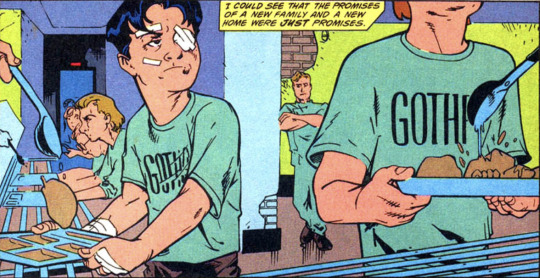
Robin (1993) Annual #4
As for your other question...in one version of Dick’s origin story, following his parents’ deaths, Dick was sent to Gotham’s Youth Center. This center was essentially a juvenile detention center; most of the kids were sent there for committing what are described in comic as “adult crimes.” It was a very rough environment for Dick, especially in the aftermath of his parents’ deaths.
Dick going to the center after his parents died is technically a retcon of his origin (ie it was something added later). I know for some reason certain people hear the word retcon and immediately are like “then it doesn’t count!!!” but I think that is very much the wrong approach. True enough, some retcons are bad--that is, those that completely ignore previously established characterizations or plot points, and in doing so often radically change the story for the worse. It’s fine if people want to ignore those bad retcons, I do so myself. But, that’s not true for every retcon lmao. I’d say the juvie origin retcon is a great example of a good retcon. It really helps to clarify and enhance the original story, and I don’t think it should be dismissed. Hear me out here:
1.) The juvie origin doesn’t replace any previous origin story--it really only adds to and improves upon the timeline of Dick’s original origin.
For the most part, in previous tellings of the story, Dick’s origin went pretty much straight from his parents dying to him and Bruce in Wayne Manor. It’s a pretty sudden, jarring jump; the in-between was largely left to the reader’s imaginations or implied to not exist at all. And I’ll be real...the pacing and immediacy of events is pretty wonky and unreasonable. In one of the most extreme speed runs through Dick’s origin I’ve seen, Dick’s parents die and Batman immediately swings down from the rafters and tells Dick that he’ll solve the case...while Dick’s parents’ bodies are still cooling a couple feet away (Batman #436). Yeah, that is absolutely ridiculous lmao, as is the idea that Bruce just immediately adopted Dick the day his parents died. I think that the juvie origin very nicely slows things down and helps to organically fill in the gap of time that would and should exist between Dick losing his parents and being taken in by Bruce.
2.) The juvie origin helps to rationalize Bruce’s reasoning for taking Dick in.
In previous origin stories, Bruce’s main motivation for taking Dick in is that he saw his own suffering reflected in Dick and wanted to help him. I dig the parallels between Bruce and Dick...but this is very flimsy reasoning to adopt someone lmao. With all the tragedy that occurs in Gotham, you cannot tell me that Bruce had not run across some orphans before. Bruce sympathizing with Dick certainly should be part of what motivates him, but there needed to be something more. If there is not some immediate, urgent reason to adopt Dick, then it makes zero sense that Bruce would try to raise him honestly. Why would Bruce tear Dick away from his remaining family and friends at the circus? Why would Dick want to leave? And even if Dick could no longer remain at the circus, why wouldn’t Bruce allow Dick to go to a good foster home, especially since Bruce is so laser focused on his solo crusade against Gotham’s crime that he doesn’t even allow himself to have a steady girlfriend half the time? Lots of plot holes here!
The juvie origin fixes a lot of these issues! Staying at the circus is not an option for Dick, not because Bruce just snatches him away, but because legally Gotham Juvenile Services says that the circus is an inadequate environment for raising a child. Dick is sent to juvie, and the comic makes a point of showing Dick nearly being beaten to death almost immediately upon arriving.
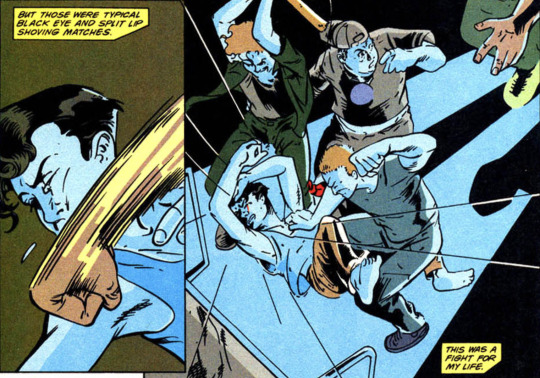
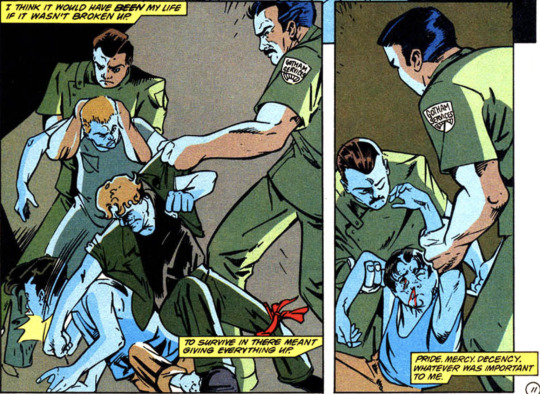
Dick is in danger and he’s lost in the system, so there is no longer a possibility for him to land in a good home. Initially, when Bruce goes to find Dick, he’s still tracking him down only with the intention of getting justice for Dick by solving his parent’s murder. But Bruce is a good person at heart. When Batman finds Dick trying to escape from the juvenile hall, beaten to hell, he intervenes. The next morning Dick is taken in by Bruce Wayne.
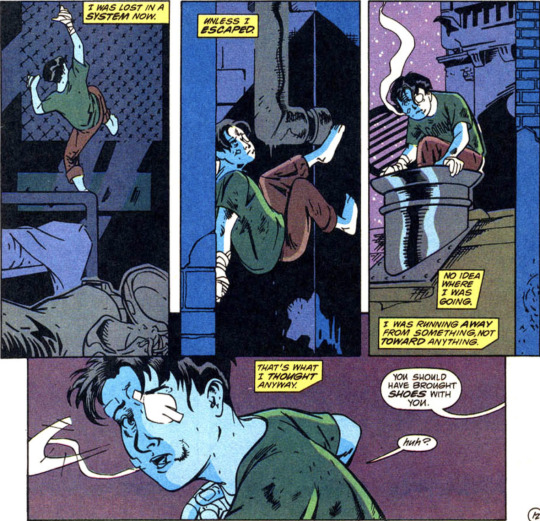
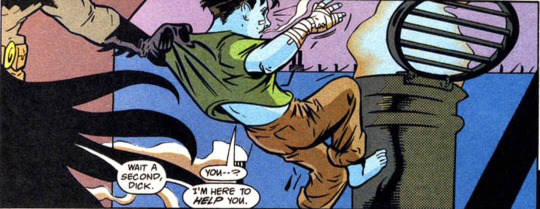
So now, taking in Dick isn’t Bruce tearing Dick away from the chance of having a loving family and throwing him into the dangerous life of a crime fighter; taking Dick in is Bruce saving Dick from a horrible situation, possibly even saving his life. The only way to get Dick out of the potentially deadly situation he was in quickly was for Bruce to take him in as a foster parent. Bruce’s actions actually make a lot of sense! And Bruce is forced by necessity to take on a fatherly role that he does not feel suited or prepared for, rather than him adopting Dick on a whim. The juvie origin gives this scenario the urgency and necessity that it desperately needed.
3.) The juvie origin has been around for a long time, and pretty successfully adds nuance to Dick’s character without completely altering or changing who he is.
The juvie origin is a retcon that has been established for about 25 years, fyi. Robin Annual #4, which is where this idea first came into play, was released in 1995. There are also references to this origin story in Nightwing Vol. 2, and that comic series ran from 1996 to 2009, so it’s not like the juvie origin is completely baseless or totally removed from the narrative.
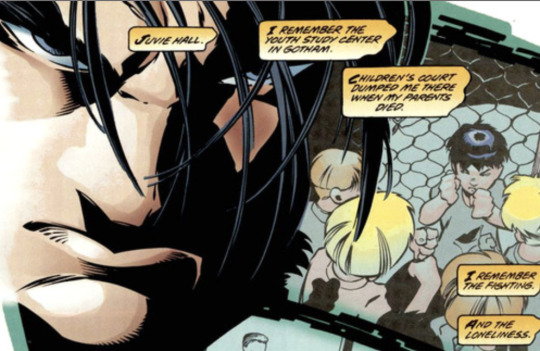
Nightwing (1996) #11
Also...Dick Grayson has been around for 80 years. In DC comics, I’m pretty sure he is predated only by Superman and Batman. You are inevitably going to have to add nuance to his character as time goes on. The juvie origin adds a very interesting complexity to the character and his fight against crime, considering he himself has been in the system...there’s so much untapped potential there!! So yeah, I feel like the juvie retcon is a very valid addition to Dick Grayson’s origin story. Plus, Robin Annual #4 is just a very well written and well thought out comic book that really fleshes out Bruce, Dick, and Alfred’s initial relationships to one another in a realistic way, and more people should check it out.
What I’m saying...is that more people need to get on board and accept the juvie origin guys!! It’s my favorite origin for Dick, hands down. Thanks for giving me an excuse to talk about it anon.
As for where to go for more info…well, you can always check out Dick’s DC wiki, or anyone else’s, for basic summary info. For me, I always like going straight to the source. You could find a comic rec list that focuses on what you’re interested in and just dive in and build your knowledge that way. Sometimes if you google around, you can find neat creator interviews that address questions like the ones you asked. If nothing else, I’m sure there are people on tumblr (like me :D) or elsewhere online who are willing to help you out and point you in the right direction if you’re curious about something in particular. Idk if other people know of a good resource for things like this?
#thanks for the ask anon!#ask#dick grayson#robin#bruce wayne#batman#alfred pennyworth#juvie hall#meta#romani#romani dick grayson
714 notes
·
View notes
Note
interesting post you've written about Cass/Raps being a tragic romance. maybe you'll be feel better if you write a longer one on your thoughts on that... ;)
Okay this took me WAY longer than I expected but y’all ask for tragic readings and I deliver, so may I present: Rapunzel and Cassandra as a tragic romantic subversion of the Knight in Shining Armor.

Alright, as a disclaimer I will say that the way this reading works is that it’s just that: a reading. Cassandra and Rapunzel as a tragic romance (while simultaneously remaining a fantastic depiction of female friendship) is an interpretation of TTS that I find incredibly valid and, in a storytelling sense, rewarding. This isn’t to say the creators intended it to be that way or that this is the one and only reading of Cassandra and Rapunzel’s dynamic, but it is a reading I subscribe to and believe to hold evidence, support, chemistry, and immense value in a literary and creative sense.
So let’s get into why that is.
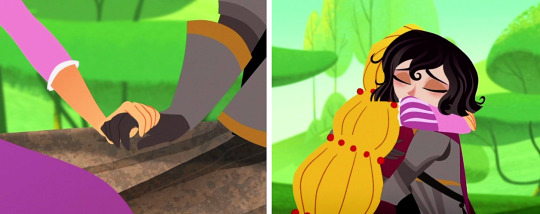
Consider Cassandra and Rapunzel, together. Their friendship is well established even as the show starts, and over the course of the series we watch Cass serve as a foil to Raps in a multitude of ways: she’s the experience to her inexperience, the logical to her creative, the knight to her princess. Cass wears dark earth-tones in her preferred clothing while Rapunzel opts for a vibrancy of pinks and purples; Cassandra’s approach to problems is straightforward and direct, while Rapunzel’s involves planning and imaginative thinking (see: Queen for a Day, the use of the Demanitus Device); Cass is private and reserved, Rapunzel open and outgoing.


The building blocks of their dynamic are prime material for a developing romance, complete with tension, conflict, and positive growth. They’re complementary opposites in most of their mannerisms, yet both are brave, adventurous, intuitive, competitive, and though they show it in different ways, ultimately good and compassionate people.
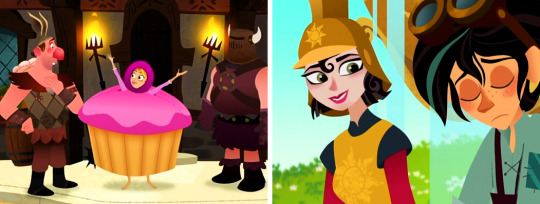
So why is this a tragedy? Why is it that Rapunzel and Cassandra’s relationship is inherently doomed, shot through with hairline fractures that lead to a temporary yet heartbreaking betrayal in Destinies Collide?
The answer lies not only in context and circumstances, but even deeper, in the very core of their characters; Rapunzel’s driving force is freedom, and Cassandra’s is control.
While the previous description of Cassandra and Rapunzel as foils lists complementary opposites, puzzle pieces that ultimately still fit together, these two forces are repelling magnets, each of them informing many of Cass and Rapunzel’s individual character flaws and virtues.
Perhaps the root of the tragedy that encompasses Cassandra and Rapunzel’s story is that both are justified in being driven by their respective desires. Cassandra, who has spent most of her life striving for a position she can’t reach, trying to prove herself worthy of respect and trust and arguably doing just that, has yet to see the rewards for her hard work. She is never given the position of control and influence she desires, despite having developed both her skills and her instincts.
Rapunzel, similarly, has every right to the freedom she was crucially denied in her past; after enduring emotional manipulation and abuse throughout her childhood, abuse exacted with the intent to keep her isolated and caged, there can be no other resolution than that she fight against any and all restraints.
Yet freedom for Rapunzel is a double-edged sword. Despite her escape from the tower that was her prison, she finds herself in the position of a princess and future queen, a role that comes with rules, regulations, and no shortage of trials. As Rapunzel and the audience discover in Queen for a Day, her royalty can put her in positions where she is anything but free to act, and if she’s to be an effective ruler, she has to learn to compromise. Sometimes, to devastating results.

Cassandra, likewise, is forced to show some of her more fatal flaws when it comes to her desire for control. Her stubbornness and occasional tunnel-vision are a result of that need to be in charge, that need to be heard and listened to oftentimes above anyone else. Being unfairly ignored, combined with her tendency to keep her true feelings bottled up, leads to her putting ambition over her relationships and sometimes lashing out harshly, going further than she previously intended. It happens in Challenge of the Brave when she competes less than ethically against Rapunzel, Great Expotations when she backs out of her agreement with Varian, and most notably in a brilliantly written yet incredibly heartwrenching episode, Rapunzel and the Great Tree:

“Cass, you of all people should know I can handle myself pretty well out here. I don’t need someone to keep me safe.”
It begins here, with Rapunzel’s honest but unintentionally hurtful remark. As the audience already knows, Rapunzel doesn’t need protecting, but in the moment she says it the question must be asked: if Rapunzel needs no protection, no guardian, no knight… what does that make Cassandra?
Cass, who has chased after a position as a guard of Corona, who promises her king that she’ll keep his daughter safe, whose moment of truth in the first season was stepping up as captain and leading the attack in Old Corona. If she’s not the knight in shining armor, who is she?
And of course, we might be able to come up with a plethora of answers. She’s Rapunzel’s best friend, an excellent strategist and fighter, an adventurer, a hardworker, her own individual woman, and much more. Yet, despite her frustration of being put in second place, of literally waiting in the wings, Cassandra insists on existing in Rapunzel’s shadow. She wants recognition, a position that comes with honor and control, but she wants them in close relation to Rapunzel because of the love she holds for her.
There lies Cassandra’s dilemma: she’s afraid of what might happen if she ever breaks out of that shadow, if she ever achieves her goal and comes center stage. If she’s not Rapunzel’s protector, will she have any place in her life? Cassandra, desperate to remain near the woman and friend she’s fallen in love with, has meticulously sculpted her own future around her, and in doing so has forgotten to take into account that Rapunzel might not follow that exact route.
Now, is there anything wrong with Cassandra wanting to serve as Rapunzel’s protector? Not at all. The two of them have proven on multiple occasions that they’re a formidable team, as well as close friends, and Cass is more than up to the task. Yet we-the-audience know that Rapunzel, driven by freedom and currently undergoing an arc that’s whole purpose is reclaiming her agency, deserves the right to make her own choices (a fact driven even further home as we see Zhan Tiri’s disciples, the most significant of villains in the series, try desperately to take away that exact ability).
And those very choices are what cause the rift between herself and Cassandra.

“I can’t do that, Cass.”
“What do you mean you can’t do that? Are you that obliviously naïve that you can’t–”
“Enough, Cassandra!”
It’s in this particular moment where Rapunzel and Cassandra’s staple characteristics flip: Cass, normally able to keep her feelings tightly bound, is emotional and angry, while Rapunzel (in stark contrast to her uncertainty in Queen for a Day) becomes stern and unmoving.
The brilliance and heartbreak bound in this scene is that Cassandra, though ultimately right in her insistence that the group move on from the Tree of Zhan Tiri, has unknowingly echoed rhetoric that Gothel, Rapunzel’s abuser, once used to keep her in line. The tragedy is that Cassandra is right but goes too far, and that Rapunzel has every right to respond harshly.
Because, when it comes down to it, Rapunzel retains her freedom through having the control Cassandra cannot.
And thanks to the particularly tense events of season two, the two of them have not found a compromise that allows them to share it. As Cassandra attempts to exercise the control she’s worked towards for so long, she is unwittingly depriving Rapunzel of the freedom she’s only just recently found. On the other hand, Rapunzel, in exercising her own agency and stepping into the role she has long been training for, deprives Cass of an agency of her own.
It is important also to remember that, though friends, Rapunzel and Cassandra retain a professional relationship of a royal woman and her subject, a princess/heir to a kingdom and her sworn protector. It’s this relationship that ties control and freedom so closely together for both of them, further complicating their character progression and dynamic.
And truly, why shouldn’t Cass be respected and her advice heeded after all she’s proven her capability? And again, why should Rapunzel have to sacrifice any of her agency or her own sense of capability for the sake of Cassandra? There’s a balance between them, but one that is delicate and often interrupted, eventually to the point where we realize that Rapunzel and Cassandra’s motivations, however justified, are doomed to clash.

A comparison between the dynamics of Rapunzel, Cassandra, and Eugene is vital to this reading, though not in the ways one might think. Both Eugene and Cass legitimately and truly love Rapunzel, and neither of their love is diminished by the other. The main difference is within Cass and Eugene’s individual characters; while Cassandra and Rapunzel are both in the midst of their journeys of self-discovery (the thing that leads Cass to most of her inner and outer-conflict), Eugene was not.
Eugene and Cassandra parallel one another in their roles as Rapunzel’s support, but Cassandra isn’t satisfied or even entirely comfortable in that position. Her desire for control, for her own agency, provides an obstacle that Eugene simply doesn’t have throughout the majority of the series. This, as it happens, is the root of his crisis in Destinies Collide; Eugene’s betrayal to the group is so brief due to the uncertainty of the situation, and ultimately is overcome by him reaffirming the identity he’s always had.
Cassandra, however, has not yet fully discovered her own identity. She has no deep foundation, no certainty to fall back on, only her contrasting desires and an incredible drive to accomplish them.
Unlike Cassandra, Eugene has already lived center-stage as Flynn Rider. We watch him develop past his selfishness and arrogance, watch as Rapunzel becomes his “new dream,” and continue to watch as their relationship is reaffirmed in the series. One of the most refreshing aspects of Eugene and Rapunzel as a couple is the healthiness of the dynamic, the lack of manufactured drama (i.e. drama for drama’s sake), and the genuine love and maturity woven into their relationship.
None of this is to say that Eugene is at all better or superior to Cassandra, or Cassandra better or superior to Eugene; rather, the parallels and differences between their two characters help illuminate the inner-workings of their respective relationships with Rapunzel. They both love her, but how that love thrives in one dynamic and hurts in the other comes down to this: Eugene is done with center stage, and Cassandra has never even been in it.
The tragedy of Rapunzel and Cassandra’s romance, then, is this: though they deeply love and care for one another (and always will), though they have helped one another grow, have made each other better people in a way no less valuable than Rapunzel and Eugene have, they’ve reached the point where they no longer can. They aren’t toxic to one another, but static; if Cass wants her moment in the sun, a moment she fully deserves, she needs to pursue it on her own.
And Cassandra is afraid to accept that.

This aspect of analysis will try to avoid going into too much speculation, since the whole story behind Cassandra’s betrayal is still a mystery. That aspect aside, this moment is undeniably where Cass’ inner-conflict comes to a head.
How does Cassandra get everything she wants? How does she stay with Rapunzel while also getting the control and agency she craves? Cass won’t accept a world where she has to operate independent of Rapunzel, yet it’s independence that she longs for. This, possibly combined with a desire to protect Rapunzel and save her life (and/or supernatural influence from mysterious room in Rapunzeltopia), moves her to grab the moonstone, to stop “waiting in the wings” and move center stage.
The tragedy isn’t that Cassandra is evil, or that she’s too selfish or arrogant or jealous. No, the tragedy is that Cassandra is a character perfectly tailored to have her own protagonist’s journey, but cannot let go of being her princess’ knight in shining armor. And it’s that very armor she now wears that might well end up corrupting her.
#tts#tangled the series#cassunzel#cassandra#rapunzel#rta#rapunzel's tangled adventure#cassandra x rapunzel#holy crap this took me forever but here it is#send me an ask if you want me to expand on anything#I could have gone on even longer wtf#anyway tl;dr cass and raps are in love and VALID#also the ot3 is alive and I WILL die on this hill#good day.#my meta
354 notes
·
View notes
Note
What do you think about the Citadel arc? Specifically, about Anakin and Tarkin's interaction, and Anakin kind of... liking Tarkin's perspective on how war should be handled? I'm asking because I have always felt it quite out of character, I mean yeah no doubt he could agree that the Jedi should not be the ones leading the Republic army because he knows it's a bit hypocritical, but on the rest... I don't think Anakin would get along with him so well? What's your take? :)
I’ll start by being super honest: tcw!Tarkin creeps me out. I don’t even know why. He just does. And I don’t enjoy his interaction with Anakin (or any other character) because of that. That being said, I don’t think there was anything OOC about his interactions with Anakin. I don’t see them as friends or even friendly. I see it more as a mutual respect type of thing. They are both pragmatics. They have their own agendas but they understand the seriousness of the situation and how ineffective the Jedi are in handling the war.
Also, I think Anakin’s respect for Tarkin involves more than just “he agree with me”. Anakin has always been different from most Jedi. His past (and Palpatine’s “lessons”) made him more critical of the Order and to hear a high ranking official openly criticize the Order probably made him feel like his owns ideas were legitimized.
No one was ever quite that openly anti-Jedi in Anakin’s presence before. All previously criticism came from enemies (Dooku, Ventress, Separatists, etc.) whom Anakin was taught by the Jedi are mad and shouldn’t be heard. Padmé and Palpatine might disagree with the Order’s methods but they are never THAT harsh. Also, remember that Tarkin didn’t gave the Seps the information and, in Anakin’s book, that makes him a stand-up guy. So, to have his ideas validated by a loyal and sane GAR officer is what made him more open to Tarkin as a person.
We need to acknowledge the bias against certain characters and their criticism of the Jedi. we see characters like Dooku, Ventress, Tarkin and Barriss saying, pretty straightforwardly, what’s wrong with the Jedi and why they are losing and yet the Jedi (and most of the audience) dismiss those claims because of who is saying them.
The thing is, and it hurts me to say it, Tarkin was right (damn, this is something I never thought I would say). Let’s take a look at their interactions and see why Tarkin and Anakin were right and why they ended up respecting each other.
Tarkin: I reserve my trust for those who take action, general Skywalker.Anakin: Then let me remind you, we rescued you back there. And I reserve my trust for those who understand gratitude, Captain Tarkin. [TCW 03x18]
Here it’s established their differences (and why they will never be real friends). Tarkin is contemptuous. He does not trust the Jedi and their ability to act the way he judges to be right one. Only the actions Tarkin deems right truly matter. Anakin, on the other hands, admires loyalty, friendly, humility. He may not agree with the Order but he doesn’t dismiss it. they are both practical men, willing to do what’s necessary to end the war, but their motivations will always keep them at odds.
Tarkin: I am concerned that the jedi have elected this child to lead the group. Rex: I’ve served with her many times, and I trust her, captain. [TCW 03x19]
Here’s a truth bomb that no one wants to acknowledge. Tarkin and Anakin were the only ones concerned by the fact a teenager girl was involved in a war. Again, they were worried about Ahsoka’s presence there for very different reasons but we can’t deny the Jedi’s treatment of children played a part in their downfall (especially this child). Anakin, like Tarkin, is aware that this is wrong. I don’t think they both discuss this particular subject on screen but Tarkin makes it pretty obvious that he’s not pleased with the situation (Ahsoka being there) and the Arc focus a lot on Anakin’s protecting Ahsoka so I like to see as a nice parallel there.
Tarkin: This ordeal only demonstrates how effective facilities like The Citadel are. Pity it ended up in separatist hands and not ours.Anakin: He has a point. [TCW 03x19]
I think this is the first time they openly agree on something. It shows how far they are both willing to go to achieve their ends. We (the audience) know what their ends are, however, they don’t. It’s important to remember that while we know what kind of man Tarkin, Anakin doesn’t. Anakin sees Tarkin as a respectable GAR office who wants to save the Republic and nothing else. He had no way of knowing the kind of horrors Tarkin would commit if he ever get his hands in a place like the Citadel. And Tarkin has no way of knowing Anakin is against imprisoning enemies without trial in secret prisons.
As I said before, their agreement is superficial. They agree the ends justify the means but they completely disagree on the ends and the means.
Tarkin: You may have earned my trust, general Skywalker, but my faith in your comrades is still lacking.Anakin: You lack faith in the jedi.Tarkin I find their tactics ineffective. The jedi code prevents them from going far enough to achieve victory, to do whatever it takes to win, the very reason why peacekeepers should not be leading a war. Have I offended you?Anakin: No. I’ve also found that we sometimes fall short of victory because of our methods.Well, I see we agree on something. [TCW 03x19]
Again, superficial agreement. Tarkin’s secret solution is mass murder, torture and genocide. Anakin’s secret solution is for the Jedi to get more involved, fight corruption, teach communities how to protect themselves, etc. But since they don’t know that, thye believe they are on the same page. And for Anakin, to hear this sort of Jedi criticism from a “reliable” source validates his ideas and makes Tarkin seem like an intelligent and mindful officer.
Ahsoka: Why did master Piell have to share half the intel with that guy? It’s like he’s not even grateful we rescued him.Anakin: Captain Tarkin feels the jedi should be relieved from the burden of leading the war effort.Ahsoka: That’s ridiculous.Anakin: Maybe, but we aren’t soldiers. We’re peacekeepers. The jedi code often prevents us from going far enough to achieve victory.Obi-wan: A rather simple point of view.Anakin: Either way, he is a good captain. [TCW 03x19]
This right here is exactly why Anakin listens to Tarkin. Every time Anakin criticizes the Order this happens. His thoughts are dismissed. The Jedi, being peacekeepers, shouldn’t be involved in war? that’s ridiculous! Now remember that Anakin spent 10 years of his life being told the Jedi couldn’t help his mother and fight slavery because their are peacekeepers and not law enforcers. THAT’s ridiculous. Anakin knows first hand the hypocrisy of the Jedi Council and every time he tries to point it out he’s dismissed. And suddenly, this officer appears and he’s saying all these things Anakin always tried to say, so, of course, Anakin will listen to him. That’s exactly how Palpatine got to him the first place. By pointing out all the wrongs Anakin already knew existed and acknowledging them.
Anakin, like everyone else, wants to have his feelings and ideas acknowledged. Here’s an exemple: Anakin wants people to acknowledge that slavery is an issue because the Republic doesn’t care about slaves. The Jedi tell him it’s not their problem and there’s nothing they can do about it. Palpatine tells him it’s a problem, the corrupt senate is the reason why and that he’ll try do to something about it. Which opinion will Anakin deem more sensible? Of course, he’ll respect the one that acknowledge his suffering.
If the Jedi were more willing to discuss “uncomfortable subjects” and teach their students to think for themselves Anakin would’ve never been in this situation. He ends up gravitating towards guys like Palpatine and Tarkin because they are the only ones to seem to recognize the problems he knows exist.
Tarkin: I’ve fallen into favor with the chancellor.He shall support me.Anakin: Oh, I happen to know the chancellor quite well, myself. [TCW 03x20]
This was the nail in the coffin. If Palpatine respects and listens to this guy so why shouldn’t Anakin?
Tarkin: I wish more Jedi had your military sensibilities. Perhaps I can inform the chancellor of your valor.Obi-wan: I’m not sure what to think of your new ally.Anakin: Well, I think we need people like him. This is a war. If we aren’t willing to do what it takes to win, we risk losing everything we try to protect.Obi-wan: Unfortunately, war tends to distort our point of view. If we sacrifice our code, even for victory, we may lose that which is most important: Our honor. [TCW 03x20]
I love Obi-wan with all my heart but this is exactly why they failed. They already sacrificed their code. They did long before the war started. And even if they hadn’t, they sacrificed when they, the peacekeepers, accepted to fight the war. The Jedi are not worried about honor or their code. They were willing to assassinate their enemies (that’s canon btw). Jedi hypocrisy strikes again. This is already way too long so I’ll try to keep it short:
Anakin and Tarkin do not know each. Not really. They agree the Jedi Order is making mistakes and that is it. They have no idea how far the other is willing to go or what they really want. They respect each other’s opinion but they are not friends (because they don’t truly know each other).
I don’t think it’s out of character for Anakin to agree with Tarkin because Anakin has no idea what he is agreeing with. Anakin has criticized the Order’s methods before, so he siding with someone doing the same is natural. Besides, Anakin remained in character by defending Ahsoka’s abilities (and everyone else’s too). Anakin’s only agrees with Tarkin on the political aspects of the Order. He still respects the Jedi abilities to overcome hardship, to save people and get the job done.
#ask#anon#anakin skywalker#Tarkin#the clone wars#jedi order#sw meta#sorry for the length#I have no self control#Anonymous#tcw meta#meta: anakin#jedi politics#txt#gffa politics
110 notes
·
View notes
Text
You don’t have the right to control how others perceive you
You don’t have a right to change someone’s view of you. You don’t have a right to convince someone of your “true” identity. And you don’t have a right to convince someone out of their own reality.
At times, people can feel as though it is their duty to help someone see the “truth”. To bring someone out of their own perception and frame of reference and expose them to alternatives. At times, we see this as a virtuous endeavour as we tactically attempt to say the right thing at the right moment, so that someone sees the error in their ways.
For example, say your ex partner was deeply narcissistic and was never truly loved. You make it your goal to show them real love does exist that is not conditional, and that their actions are self serving. You have a goal. To walk them out of their narrow perception, into a reality that aligns more closely with what is “true”, or what is more resourceful.
Second example. Say your ex partner calls you a self-centred slut. You do not accept this, because it does not mesh with your self perception, nor is it accurate. So you list off the many ways that you do not fit this label/insult. Still, they maintain the accuracy of what they said. So you both engage in this pattern of interaction that consists of insults or defences.
Third example. Your partner is very close minded, and you try and address this by telling them they are close minded, and it is acting against their best interest. You want to help them see their flawed patterns that ultimately disadvantage them. They deny this, and say you are close minded. You feel baffled, and say they’re projecting their own shortcomings on you. This pattern of denial and accusation continues.
In all of these cases, the similarity is that you have a stake in another person’s perception. You make your sense of self, your inner peace, and your identity contingent on their conformity with your perception. We often do this, and we find virtuous reasons for doing this. For example, you want to help the person overcome negative patterns, help them see with more clarity, allow them to be open to new and exciting experiences. Your desire to change their perception is not motivated by malice. However, I will argue that this pursuit is both futile and exhausting.
As I mentioned, it is not your responsibility to change someone’s mind. If someone wants to hold an inaccurate view of you, the world, or their own lives, it is not your responsibility to correct that. More importantly, you have no right to infringe on someone’s reality and perception, and assert that yours is more accurate and better.
Now I am not advocating to never help others heal, get closer to the truth, or develop habits that are conducive to their wellbeing.
What I do advocate for, is inner peace and acceptance. And to resist someone else’s perception, necessarily implies that your own sense of self, validity, and comfort is tied up in their perception. If it wasn’t, why care? Why care how their feel, interpret, and think? Resisting or challenging the perception of another person is a very tiring endeavour. Because to change the mind of someone in a state of resistance is challenging. To change the mind of someone whose perception is a survival mechanism, or was developed to cope with trauma, is not always resourceful.
So what is the point of saying all this? Essentially, to direct your energy elsewhere.
Allow people to hold inaccurate views of you. Allow your ex to think you’re a slut/fuck boy. Allow people to assume the best, or assume the worst. It is not your role or responsibility to control how others see you, because it ultimately does not matter. The desire to control the perception of others speaks to an insecurity within you.
I have a friend who is deeply upset with me for many reasons I do not understand. He told me that he thinks very differently of me, and does not have the same level of respect for me. Previously, this would have been devastating for me. I would have pondered why this is the case, what I did wrong, and if others think similarly.
My response to him telling me this, was “Okay. Think whatever you like. That doesn’t change who I am”. And that sentiment is completely accurate. Whether he respects me or not does not alter my level of respectability. It does not alter my relationship to myself, and I no longer allow it to alter my peace. So with that feedback from him, I did not dwell or try and convince him otherwise. Because it is not my right, role, or responsibility to do so. My responsibility is to be authentic and have integrity.
Taking on the role of controlling the perceptions of others so that they adhere to your own, are flattering to you, or more closely approximate reality, is none of your business.
For those who invalidate your reality, treat you poorly or criticize you- your role is not to convince them to hold you in high esteem. Rather, your role is to maintain your own inner peace, integrity, and truth. And that might require ending that relationship, establishing firmer boundaries, or not identifying with that person. Controlling the way others see you is a signal of discomfort with yourself. It speaks to an intolerance to the views of others. Additionally, the desire to heal a narcissist, someone who is delusional, or anyone else who is out of touch with reality- is a signal of your own intolerance.
Why do you move towards rather than away from, individuals who are “out of touch” in some way? Why do you not seek those who enhance the quality of your perception, and who are receptive to connecting with your own?
0 notes